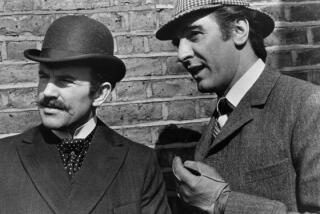Share ‘Rear Window’ Earnings, Justices Order
- Share via
WASHINGTON — The Supreme Court, in a ruling that could affect millions of dollars in movie industry profits, said today that distributors of the Alfred Hitchcock thriller “Rear Window” must share earnings from the film’s re-release with a literary agent.
The 6-3 ruling was a defeat for actor Jimmy Stewart and Hitchcock’s heirs. Some film producers claimed it could limit availability of movie classics.
Stewart, Hitchcock’s heirs and others sought to prevent literary agent Sheldon Abend from receiving a share of profits from “Rear Window’s” re-release in 1983.
Abend paid Chase Manhattan Bank $650 in 1971 for the copyright to the short story on which “Rear Window” was based.
He sued in federal court seeking a share of the more than $12 million in revenue that the film has generated since 1983, when the 1954 classic was released again in theaters and for the first time on rented videocassettes and over cable television.
“Rear Window” is based on a short story, “It Had to Be Murder,” by Cornell Woolrich that was first published in 1942 in Dime Detective Magazine.
The motion picture, starring Stewart and Grace Kelly and directed by Hitchcock, had many elements not contained in the original short story.
Woolrich sold the movie rights to his story in 1945 for $9,250. When he died in 1968, his property--including the copyright to his story--was left to a trust administered by Chase Manhattan.
Abend said the re-release of “Rear Window” infringed on his copyright, and he also said the film distributors interfered with his plans to contract with Home Box Office cable TV for a new play and TV version of the story.
The Supreme Court today upheld a federal appeals court ruling in Abend’s favor. The case now goes back to a lower court to determine how much money Abend will receive.
The justices reached their decision by interpreting federal copyright law.
Today’s ruling does not let Abend block distribution of “Rear Window.”
Nonetheless, some of the nation’s leading motion picture producing companies who supported the appeal by Stewart and Hitchcock’s heirs said a victory for Abend could mean that thousands of films based on books, plays and short stories might have to be withdrawn from distribution. More likely, it means that they could have to share profits from the films with copyright holders.
More to Read
The biggest entertainment stories
Get our big stories about Hollywood, film, television, music, arts, culture and more right in your inbox as soon as they publish.
You may occasionally receive promotional content from the Los Angeles Times.









